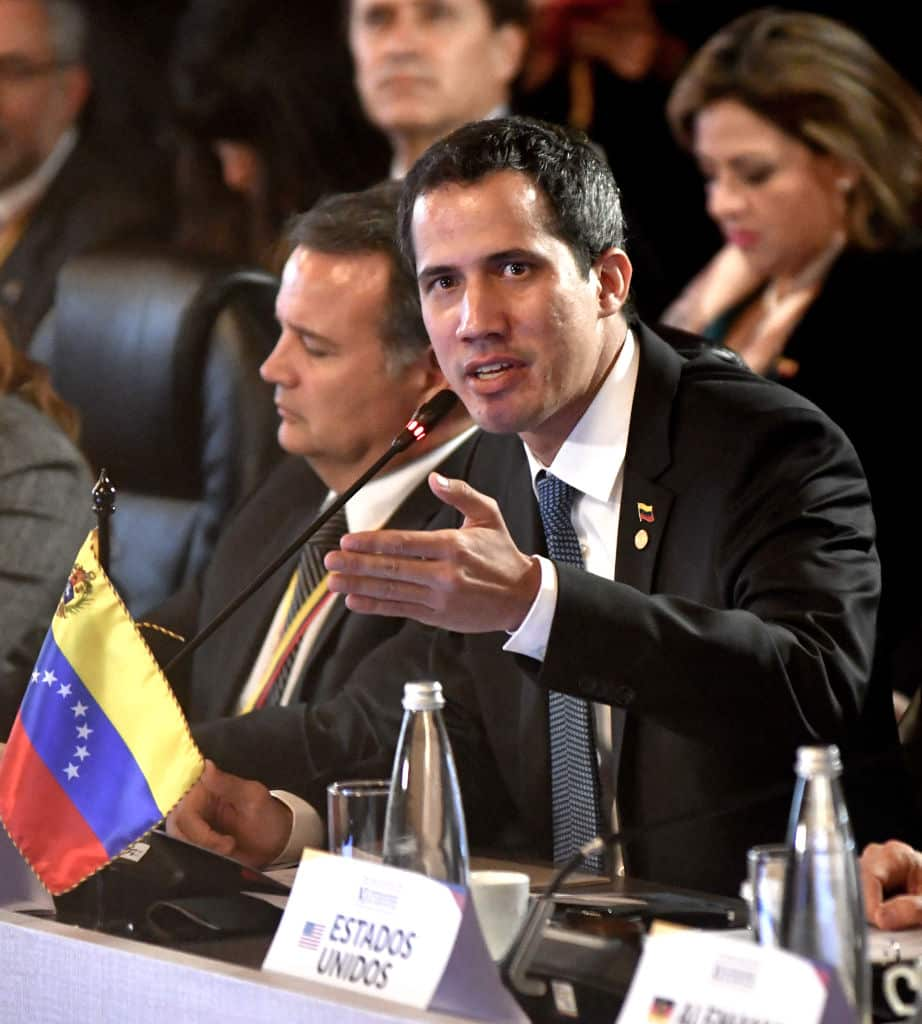US Vice President Mike Pence and Venezuela opposition leader Juan Guaido agreed on a strategy to increase pressure on President Nicolas Maduro following a meeting with regional allies in Colombia on Monday.
Mr Maduro hit back in an interview broadcast the same day, saying the meeting was aimed at setting up a parallel government and accusing the US of coveting his country's oil and being willing to go to war to get it.
"We hope for a peaceful transition to democracy but President Trump has made it clear: all options are on the table," said Mr Pence, who passed on Donald Trump's "100 per cent" support to Mr Guaido.
The meeting came after four people were killed and hundreds injured as Mr Guaido supporters clashed with Venezuelan security forces on the borders with Colombia and Brazil over the weekend in a thwarted bid to bring in humanitarian aid.
The Lima Group -- made up of Latin American countries and Canada -- met in Bogota and said it would ask the International Criminal Court to declare "the violence of Maduro's criminal regime against the civilian population and the negation of access to international aide as a crime against humanity."
Mr Guaido warned that "indulging" Mr Maduro "would be a threat to all of America," while Colombia President Ivan Duque called for "more powerful and effective" pressure on the socialist leader.
However, the Lima Group rejected the use of force to achieve a democratic transition.
The group of 14 nations is ultimately not united in its approach to the Venezuela crisis and Mexico, Costa Rica, Guyana and Saint Lucia skipped the meeting.
"In the Lima Group, the consensus is that Mr Maduro must be removed, but there is no consensus on how to do that," political scientist Laura Gil told AFP.

'Parallel government'
The US requested an urgent meeting of the United Nations Security Council and imposed new sanctions on the governors of four Venezuelan states aligned with Mr Maduro for impeding aid shipments.
In an interview with US television network, ABC News, Mr Maduro blasted the talks in Bogota as being "politics to attempt to establish a parallel government in Venezuela."
Washington, he said, "wants Venezuela's oil" and is "willing to go to war for that oil."
Mr Guaido, the 35-year-old leader of Venezuela's National Assembly, declared himself acting president in January after the opposition-controlled legislature concluded that Mr Maduro was fraudulently re-elected.
But a Sociology Professor at Sydney University, Sujatha Fernandes says the US is attempting to instate Mr Guaido as a puppet government, with the supply of aid a vessel to provoke confrontation.
“This is a whole manufactured kind of crisis that is playing into trying to start a war and a pretext for military intervention into the country,” Professor Fernandes told SBS News.
“There already is a legitimate elected president of Venezuela and that is Nicholas Maduro. There may have been some irregularities in the election, there may have been some issues, but the fact remains he is still the president.
"So this is an overthrow. An illegal, unconstitutional overthrow of the legitimate President of a country.”
Some 50 countries recognize Mr Guaido as Venezuela's legitimate interim president.
Despite the defection of more than 270 soldiers to Mr Guaido's side -- around 100 of them crossing into Colombia on Monday alone, according to immigration authorities there -- Mr Maduro's military blockade at Venezuela's borders held firm and prevented the aid from entering.
Mr Maduro's right-hand man Diosdado Cabello proclaimed "victory" on Sunday.
"Not a single one of those trucks with aid got through," Mr Cabello said at a rally in the border town of Tachira.
Humanitarian aid has become the focal point in Mr Guaido's challenge to Mr Maduro's authority, as Venezuela suffers from a humanitarian crisis marked by shortages of food and medicine - problems exacerbated by hyperinflation, which has rendered salaries and savings worthless.
Regime 'against its people'
Mr Guaido says 300,000 people face death if aid supplies are not urgently brought in, but Mr Maduro claims it is a smokescreen to cover a US invasion.
MR Guaido accused Mr Maduro's government of turning the country into a "sanctuary of terrorists."
"The reality in Venezuela is we have a regime that is against its people," he said on Sunday.
"Today, we need to find a way to solve this crisis."
Having defied a government travel ban to got to Colombia on Friday, Mr Guaido said he would return home "this week," with the Lima Group warning he faced "serious and credible threats" from the regime.
Asked by ABC America if he would allow Mr Guaido back into the country, Mr Maduro said: "He has to respect the laws."
Mr Guaido "can leave and come back and will have to see the face of justice because justice had prohibited him from him leaving the country."
At the opening of the Lima Group meeting, Colombia's Foreign Minister Carlos Holmes Trujillo said the representatives were "trying hard to facilitate the opening of a humanitarian corridor."
Mr Pence announced $78.2 million in funds for countries hosting Venezuelans, 2.7 million of whom have fled the country since 2015, according to the United Nations.
Mr Pence also invited Lima Group members to transfer assets of Venezuela's state oil company PDVSA to Mr Guaido to keep them away from "Maduro's inner circle."
Eurasia Group analyst Risa Grais-Targow said US sanctions "will make it difficult for President Nicolas Maduro to retain power."
"However, an eventual transition is contingent on both continued opposition unity and viable off-ramps for regime insiders."
- additional reporting Lydia Feng and Jennifer Scherer.

